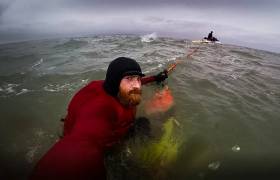Displaying items by tag: Ciaran Kilkenny
Big wave surfer Al Mennie talks to the Belfast Telegraph about how he keeps fit and healthy between his challenging surfing experiences.
In a candid Q&A, the Portrush surfer — who features in BBC Two NI show Tide this Sunday 16 June at 9.45pm — reveals the extent of the punishment he’s put his body through to ride the biggest swells.
“[From] surfing I have had broken ribs, have split my head open several times and have been concussed. I often think I’ve been very lucky.”
The “extreme” of this sportsman’s chosen field even extends to his diet — or rather, two diets.
“I eat very well and see myself as an athlete and need to fuel my body, but you will see me in a well-known fast food chain the odd time,” he says.
Perhaps understandably for someone who undertakes such a high-stakes endeavour, Mennie confesses he is “full on all the time”.
“Because I am a surfer, people think I must be chilled out — I am actually really far from being chilled out. At night I'm writing books or working on some sort of plan.”
Mennie’s book Overcome or Succumb was published last year, as previously reported on Afloat.ie. And the Belfast Telegraph has more on his story HERE.
In other surfing news, Dublin Gaelic football forward Ciaran Kilkenny tells the Irish Examiner how riding the waves had become a part of his fitness regimen.
“I generally try to go the day after a game, because you get a bit of a recovery in, too,” he says.
“Even for the head, it’s great to go to a place like Bundoran, or Strandhill or Lahinch, the sea breeze, it’s great to go down and get in the water and up on the board.”
The Irish Examiner has more on the story HERE.





























































